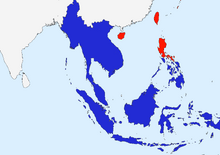The Srivijaya Empire (L'Uniona Homanus)
Posted By. Drs. Mutawalli Abdul Malik, M.Pdi.
| |||||||
| Capital and Largest City: | Thenmobang (Padang) | ||||||
| Language: official: | Sanskrit | ||||||
| others: | Khmer dialect as well as minority indigenous languages | ||||||
| Religion: | Thenmobism | ||||||
| Demonym: | Srivijayan | ||||||
| Type of government: | Monarchy | ||||||
| government: | Maharajah (High King) | ||||||
| Area: | 4,856,434 km2 | ||||||
| Established: | 677 (76 BC) | ||||||
The Foundation of the Srivijaya Empire Edit
Edit
The Srivijaya started as a project by the Japanese Emperor Koizumi to attack the Sinicans from another angle on the Asian Continent. The Srivijaya Founders were a mix of Buddhists who were thrown out of the Maurya Empire in India under the leadership of a man named Thenmobala, who then established the splinter religion of Thenmobism, as well as immigrants from the Cambodia region of South East Asia, who then became the ethnic majority in the country and from where the name Khmer originates. The Thenmobis religion became a guiding principle that led to the conquest of a part of Sumatra before the Japanese intervened. The imperial vision that the Khmer leaders was only achieved with the weapons and strategy of the Japanese and if it was not provided then their aspirations would likely have been set back many decades or centuries perhaps. In 677 (76 BC) the first maharajah was declared and he set out to take the islands of Indonesia, the taking of the sparsely inhabited, though Sinican dominated, Southeast Asian Peninsula also provided many aspects of respect and diplomacy with the Mainland countries. The Srivijaya had a small war with the Japanese to take the islands of the Phillipines but the end of the conflict concluded with the largest island of Luzon going to the Japanese and the remaining smaller islands left to the Japanese. The Srivijaya name comes from the Sanskrit, ancient language of Buddhists, words 'Sri' meaning 'radiant' and 'vijaya' meaning 'victory'.
Maharajahs of the Srivijaya Empire Edit
Edit
Jayanasa 678-693 (75-60 BC)
Srivatsav 693-701 (60-52 BC)
Balaputra 701-735 (52-18 BC)
Balaputra II 735-752 (18-1 BC)
Girindra 752-769 (1 BC- 16 AD)
Mandakranta 769-786 (16-33 AD)
Neelanchal 786-799 (33-46 AD)
Girindra II 799-811 (46-58 AD)
Balaputra III 811-829 (58-76 AD)
Privrata 829-842 (76-89 AD)
Balaputra IV 842-857 (89-104 AD)
Girindra III 857-866 (104-113 AD)
Balaputra V 866-878 (113-125 AD)
Trishanku 878-885 (125-132 AD)
Balaputra VI 885-915 (132-162 AD) Killed by Jayavarman, King of the Khmer. Last Maharajah


